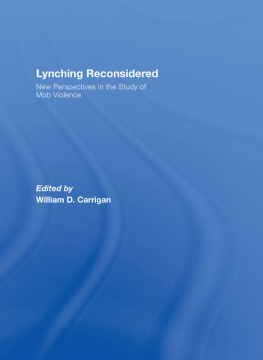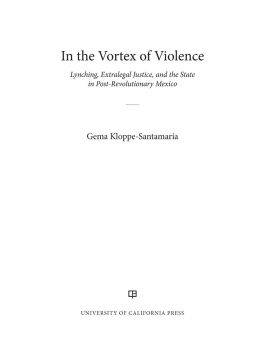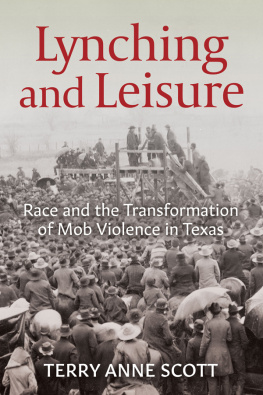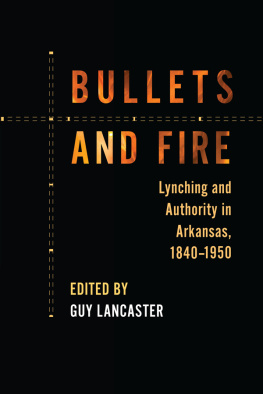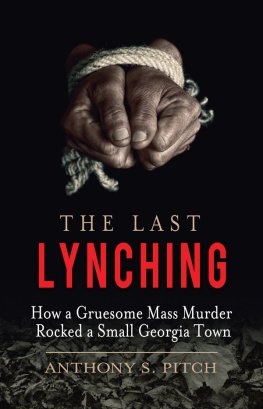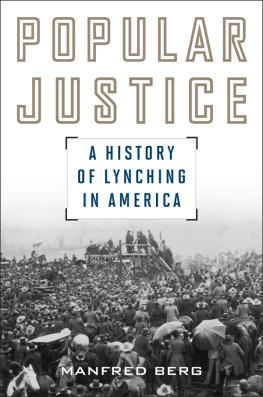LYNCHING
Davis W. Houck, General Editor
LYNCHING
VIOLENCE, RHETORIC, AND AMERICAN IDENTITY
ERSULA J. ORE
UNIVERSITY PRESS OF MISSISSIPPI / JACKSON
www.upress.state.ms.us
The University Press of Mississippi is a member of the Association of University Presses.
Copyright 2019 by University Press of Mississippi
All rights reserved
Manufactured in the United States
First printing 2019
Library of Congress Cataloging-in-Publication Data
Names: Ore, Ersula J., author.
Title: Lynching : violence, rhetoric, and American identity / Ersula J. Ore.
Description: Jackson : University Press of Mississippi, [2019] | Series: Race, rhetoric, and media series | First printing 2019. | While victims of antebellum lynchings were typically white men, postbellum lynchings became more frequent and more intense, with the victims more often black. After Reconstruction, lynchings exhibited and embodied links between violent collective action, American civic identity, and the making of the nation. Ersula J. Ore investigates lynching as a racialized practice of civic engagement. Ore scrutinizes the civic roots of lynching, the relationship between lynching and white constitutionalism, and contemporary manifestations of lynching discourse and logic today. From the 1880s onward, lynchings, she finds, manifested a violent form of symbolic action that called a national public into existence, denoted citizenship, and upheld political community. Grounded in Ida B. Wellss summation of lynching as a social contract among whites to maintain a racial order, at its core, Ores book speaks to racialized violence as a mode of civic engagement. Since violence enacts an argument about citizenship, Ore construes lynching and its expressions as part and parcel of Americas rhetorical tradition and political legacy. Drawing upon newspapers, official records, and memoirs, as well as critical race theory, Ore outlines the connections between what was said and written, the material practices of lynching in the past, and the forms these rhetorics and practices assume now. In doing so, she demonstrates how lynching functioned as a strategy interwoven with the formation of Americas national identity and with the nations need to continually restrict and redefine that identity. In addition, Ore ties black resistance to lynching, the acclaimed exhibit Without Sanctuary, recent police brutality, effigies of Barack Obama, and the killing of Trayvon Martin.:Provided by publisher. | Includes bibliographical references and index. |
Identifiers: LCCN 2018054787 (print) | LCCN 2018057399 (ebook) | ISBN 978149682160 (epub single) | ISBN 9781496821614 (epub institutional) | ISBN 9781496821621 (pdf single) | ISBN 9781496821638 (pdf institutional) | ISBN 9781496821591 (hardback : alk. paper) | ISBN 9781496824080 (pbk. : alk. paper)
Subjects: LCSH: LynchingUnited StatesHistory.
Classification: LCC HV6457 (ebook) | LCC HV6457 .O74 2019 (print) | DDC 364.1/34dc23
LC record available at https://lccn.loc.gov/2018054787
British Library Cataloging-in-Publication Data available
To my nephew William and nieces Shelby and Kalia, so that you may understand
A mob cannot afford to doubt: that the Jews killed Christ or that niggers want to rape their sisters or that anyone who fails to make it in the land of the free and the home of the brave deserves to be wretched. But these ideas do not come from the mob. They come from the state, which creates and manipulates the mob. The idea of black persons as property, for example, does not come from the mob. It is not a spontaneous idea. It does not come from the people, who knew better, who thought nothing of intermarriage until they were penalized for it: this idea comes from the architects of the American State.
JAMES BALDWIN, The Price of the Ticket
CONTENTS
ACKNOWLEDGMENTS
This book would not have been possible without the unconditional support and guidance of many. Grandma Estelle, death has had no effect upon our connection, upon my ability to feel your presence and recognize your hand in the steps I take and the achievements I make. Thank you for your powerful prayerfor your close relationship with the Man upstairs, and for raising my mother to be a loving, wise, and, most importantly, unwearied woman. Josephine, mother, thank you for being patient with such a spirited child, for loving me enough to fight for me, for pushing past motherly resignation to encourage me to blaze a trail that was quintessentially mine. To David, my father, thank you for helping me find the words to communicate who I am and what I want to be. There are indeed options, Pops. I hope youre proud of the ones Ive selected and the ones Ive created for myself. Big Bro Joe, I thank you for setting the bar high, for being an exemplary model, and for never breaking my spirit. Thank you for showing me what individual drive, spiritual faith, and ingenuity can produce. To Kanitha, Tony, Erica, Phil, and Amanda, thank you for always loving me, for always grounding me, and for never letting me forget my worth.
This book was supported by a number of intellectual and professional relationships that continue to sustain me. Keith Gilyard modeled the kind of critical questioning and resolve that helped me see this project through and that continues to serve me today. Doc, thank you for your time, for your method, for your commitment to nurturing black intellect, and for reminding me that its only three feet of water.
I am particularly thankful for the advice and fellowship of Rosa Eberly, the reassurance of Xioye You, and the encouragement of Cheryl Glenn during the nascent stages of this project. Phylissa Deroze, David Green, Damon Cagnolotti, Heather Brooks Adams, Michael Farris, Cara Yaa Asantewaa Christopher, Pia Deas, Una Kimokeo-Goes, Mia Briceo, Keith Miller, David Holmes, Heather Switzer, and Emir Estrada all gave formal and informal feedback that challenged and inspired me. And Elaine Richardson, Gwendolyn Pough, Tamika Carey, Daniel Brouwer, Karen Kuo, Karma Chavez, Lisa Flores, Annie Hill, and Jiyeon Kang, thank you for the years of critical engagement and dialogue, tears, and laughter; thank you all for walking alongside me as I struggled to navigate not only this project but also the indelible impression it has left upon me.
I am grateful for the institutional support provided by Arizona State Universitys Institute for Humanities Research (IHR) Fellowship, which supported the final stages of this project, and am especially grateful to IHR cohort members Bambi Haggins and Desire Garcia, who kept me encouraged and inspired me to keep moving forward. I additionally want to thank the AZ Ethnic Studies Working Group and the founding members of Arizona State Universitys Faculty Women of Color Caucus. This project and the ones to come are a product of the advocacy and support of these organizations and the dedicated people who comprise them. Without them, I may very well not be here.
Special thanks to Randall Burkett at Emorys Stuart A. Rose Manuscript, Archives, and Rare Book Library (formerly, Emory MARBL Library) for his support, and to the various curators, outreach directors, docents, and archivists at the Charles H. Wright Museum in Detroit, Michigan; the Andy Warhol Museum in Pittsburgh, Pennsylvania; Charlottes Levine Museum of the New South; and Cincinnatis Underground Railroad Freedom Center, who aided me during early stages of this project. Deep thanks to the University Press of Mississippi for welcoming me on board. Thank you Vijay Shah for your persistence and Craig Gill for your advocacy. Special thanks to Davis Houck for his encouragement and human kindness.


